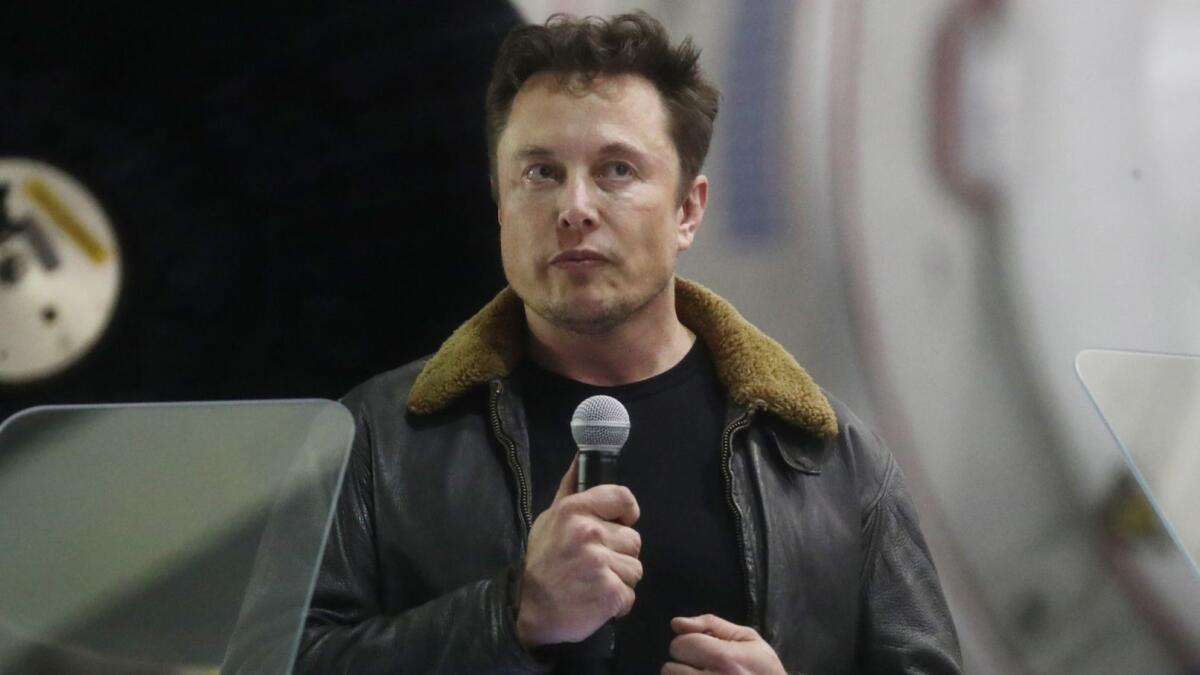Tesla stock drops almost 14% as SEC tries to force Elon Musk out of company leadership

- Share via
Tesla Inc. stock closed sharply lower Friday as investors worried about a Securities and Exchange Commission lawsuit that seeks to bar Elon Musk from continuing to lead the electric-car maker.
Shares of Tesla closed at $264.77, down 13.9% Friday afternoon.
The SEC filed its complaint against Musk after markets closed Thursday, alleging that the chairman and chief executive committed securities fraud by issuing a series of “false and misleading tweets about a potential transaction to take Tesla private.”
On Thursday evening, Tesla’s board of directors defended Musk, saying it is “fully confident in Elon, his integrity, and his leadership of the company, which has resulted in the most successful U.S. auto company in over a century.” It did not say what metric it was using for auto-company success.
Musk also issued a statement, calling the SEC lawsuit unjustified. “I have always taken action in the best interests of truth, transparency and investors,” he said.
The SEC complaint, which asks the court to ban Musk from running any public company, seeks a jury trial.
A request to bar an individual from serving as an officer or director of a public company is not unusual for SEC enforcement action, said Tom Gorman, a partner at law firm Dorsey & Whitney. But he believes a judge is unlikely to agree to force out Musk because of the likely impact it would have on Tesla, its workforce and shareholders.
“Mr. Musk is this company, in many ways,” Gorman said. “If you just say, ‘We’re not going to let you be an officer or director of a public company anymore,’ you could destroy the company and millions of dollars of shareholder value.”
If Musk is barred, it’s uncertain how long his exile would last. When the SEC charged Elizabeth Holmes and her blood testing company, Theranos Inc., with “massive fraud” in March, Holmes agreed to a bar on public-company leadership for 10 years.
Musk’s possible exit is likely one of the reasons Tesla’s stock fell the way it did, said David Whiston, stock analyst at Morningstar.
“Without Elon Musk, Tesla’s just an automaker that’s burning too much cash and has too much debt,” he said.
Regulators moved unusually quickly in filing the lawsuit, surprising experts. Part of that is due to the real-time, evolving nature of Musk’s tweets, which likely forced SEC investigators to adjust their methods from the typical archaeological dig through documents, Gorman said.
Musk’s fame may also have been a motivation for that speed. An SEC official announced Thursday in a statement that “celebrity status or reputation as a technological innovator does not give license to take … responsibilities lightly.”
Regulators may be using Musk as an example, said John Coffee Jr., a law professor who is director of the center on corporate governance at Columbia Law School. “They are also telling the world of young entrepreneurs … that we don’t care if you are the star of the sea. You can’t make a misleading statement.”
On Aug. 7, Musk tweeted that he was considering taking Tesla private at $420 a share and that he had “funding secured.” In the hours that followed, he responded on Twitter to several questions about how shareholders would be affected.
But according to the SEC complaint, Musk “had not discussed specific deal terms with any potential financing partners” and knew that the “potential transaction was uncertain and subject to numerous contingencies.”
Musk said in a company blog post on Aug. 13 that during a July meeting, the managing director of the Saudi Arabian sovereign wealth fund had “strongly expressed” his support for funding a transaction to take Palo Alto-based Tesla private. Musk left the meeting “with no question” that a deal would be closed with the fund and that “it was just a matter of getting the process moving,” he wrote.
But the SEC said in its complaint that the July meeting “lacked discussion of even the most fundamental terms of a proposed going-private transaction,” such as the dollar amount or specific ownership percentage the fund would take.
It’s unclear how long it will take for the lawsuit to reach a resolution. Ordinarily, a decision on this kind of case might take months or even years, said Ira Matetsky, a partner in the litigation department at Ganfer Shore Leeds & Zauderer LLP. There’s also a chance that the two parties could settle before the case even goes to trial, Gorman said. The Wall Street Journal reported that the SEC had reached a settlement of the charges with Musk, but that his lawyers called Thursday morning to back out.
An initial pretrial conference is set for Feb. 1, 2019, in U.S. District Court for the Southern District of New York.
Los Angeles Times staff writer Russ Mitchell contributed to this report.
Twitter: @smasunaga
UPDATES:
2:45 p.m.: This article was updated with Tesla’s stock closing price and comments from Tom Gorman, a partner at law firm Dorsey & Whitney.
11:10 a.m.: This article was updated with Tesla’s stock movement and comments from securities law experts John Coffee Jr. and Ira Matetsky.
This article was originally published at 7 a.m.







